International Status Anxiety and Higher Education – The Soviet Legacy in China and Russia
International Status Anxiety and Higher Education – The Soviet Legacy in China and Russia
Anthony Welch
Chair: Yang Rui
2:30-4:00pm
Tuesday 18 February 2014
204 Runme Shaw Building, Main Campus
Although higher education scholarship is still very Western-centric, we come to know the world of Chinese higher education better through the work of HKU scholars. The diverse world of ASEAN higher education is less well-known. But as China projects itself more internationally, growing links are evident between China and ASEAN in higher education. Such cultural and trading connections can be traced back to at least the Ming dynasty voyages of Zheng He (1420s), and even earlier to the Southern Song and Yuan period (1120s to late 1360s).
China and the countries of SE Asia are now much more intertwined economically and culturally (including the presence of a significant Chinese diaspora in a number of ASEAN member countries). Both China and ASEAN member states are keen to become innovative knowledge economies, and develop world class universities. What opportunities do this offer to each side, and what are the challenges? The seminar presents an analytic framework to consider these questions, and to illustrate with related data.
Anthony Welch is Professor of Education, University of Sydney. A policy specialist, with extensive publications in numerous languages. He has consulted to several state, national, and international governments and agencies, as well as US institutions and foundations, particularly on higher education reforms. Substantial project experience includes East and SE Asia. A Fulbright New Century Scholar on higher education (2007-08), he has also been Visiting Professor in the USA, UK, Germany, France, Japan, and Hong Kong. Professor Welch also directs the national research project, The Chinese Knowledge Diaspora, and was recently part of the team conducting Myanmar’s first Comprehensive Education Sector Review (CESR), the first since 1992.
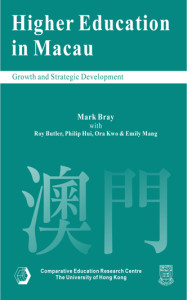 By Mark Bray with Roy Butler, Philip Hui, Ora Kwo & Emily Mang
By Mark Bray with Roy Butler, Philip Hui, Ora Kwo & Emily Mang
May 2002, 127 pp.
ISBN 962-8093-60-6.
HK$150 (local), US$24 (overseas) [add $5 /copy for air mail]
Published by Comparative Education Research Centre (CERC)
Preview in Google Books
Higher education in Macau has expanded dramatically in recent years. Before 1981, Macau had no higher education institutions; but two decades later it had 12. This book chronicles the growth, and analyses the wider environment within which the institutions operate. Discussion includes focus on the implications of Macau’s small size; linkages with Hong Kong, mainland China and other parts of the world; the changing balances between public and private provision; and the significance of political transition.
Contents
Introduction
Chapter 1: Context and Goals
Chapter 2: The Changing Nature of Macau’s Educational Provision
Chapter 3: Policy-Making and Coordination
Chapter 4: Costs and Financing
Chapter 5: Strategic for Quality Assurance
Chapter 6: Institutional Identities and Interlinkages
Chapter 7: Conclusions
Return to Other CERC Books.
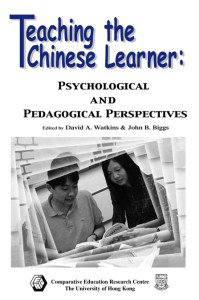 Edited by: David A. Watkins & John B. Biggs
Edited by: David A. Watkins & John B. Biggs
2001, 306 pp
ISBN 10: 962809372X
ISBN 13: 978-0864313812
HK$200 (local), US$32 (overseas)
Published by the Comparative Education Research Centre (CERC) and the Australian Council of Educational Research (ACER)
Order from CERC or online
Preview in Google Books
This book is a sequel to The Chinese Learner: Cultural, Psychological and Contextual Influences, which was first published in 1996 and has been widely acclaimed. The 1996 book made a seminal contribution to the field by focusing on the influence of cultural factors on approaches to learning in Chinese societies. Chinese learners were clearly doing some things better than their Western counterparts; but how was this achieved in large classes and harsh educational environments?
The present volume extends the earlier book by focusing on the work of teachers. It analyses the ways in which teachers in Hong Kong and China think about their teaching, and the ways in which they conduct their teaching. Differences between Chinese and Western approaches to teaching are identified, and lessons are drawn for educational reform.
Contents:
Setting the Scene
1. The Paradox of the Chinese Learner and Beyond (David A. Watkins and John B. Biggs)
Teacher Thinking
2. Towards a Model of Teaching Conceptions of Chinese Secondary School
Teachers of Physics (Gao Lingbiao and David A. Watkins)
3. The Role of Assessment in Student Learning: The Views of Hong Kong and Swedish Lecturers (Bo Dahlin, David A. Watkins and Mats Ekholm)
Teacher Practice
4. Teacher-Student Interaction: Attributional Implications and Effectiveness of Teachers’ Evaluative Feedback (Farideh Salili)
5. Are Chinese Teachers Authoritarian? (Irene T. Ho)
6. Large Classes in China: Teachers and Interaction (Martin Cortazzi and Jin Lixian)
7. Two Faces of the Reed Relay: Exploring the Effects of the Medium of Instruction (Dorothy F.P. Ng, Amy B.M. Tsui and Ference Marton)
8. Solving the Paradox of the Chinese Teacher? (Ida Mok, P.M. Chik, P.Y. Ko, Tammy Kwan, M.L. Lo, Ference Marton, Dorothy F.P. Ng, M.F. Pang, U.Runesson and L.H. Szeto)
9. Promoting Learning and Understanding through Constructivist Approaches for Chinese Learners (Carol K.K. Chan)
10. Problem-Based Learning in a Chinese Context: Faculty Perceptions
(Stephanie F. Stokes)
Changing Teachers
11. The Influence of Teacher Education on Conceptions of Teaching and
Learning (Thomas K.W. Tang)
12. A Conceptual Change Approach to University Staff Development (Angela S.P. Ho)
13. Transforming Teaching through Action Research (David Kember)
Overview and Conclusions Insights into Teaching the Chinese Learner (John B. Biggs and David A. Watkins)
Return to Other CERC Books.
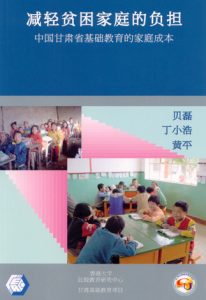 马克贝磊, 丁小浩,黄平
马克贝磊, 丁小浩,黄平
2004, 53 pp
ISBN: 9628093339
ISBN: 9789628093335
HK$50 (local), US$10 (overseas)
出版香港大学教育系比较教育研究中心 (CERC) & 甘肃基础教育项目 (GBEP)
订购本书从CERC
下载的PDF
Return to Other CERC Books.
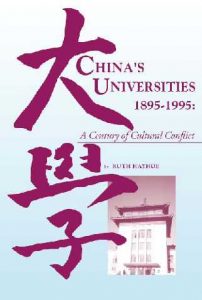 Ruth Hayhoe
Ruth Hayhoe
1999, 322pp
ISBN 962-8093-81-9
ISBN 978-962-8093-81-6
Published by the Comparative Education Research Centre (CERC)
HK$200 (local), US$32 (overseas)
Order from CERC [out of stock] or online
Preview in Google Books
Given the 1996 Choice Outstanding Academic Book of the Year award, this volume has already received critical acclaim. As one reviewer noted:
Ruth Hayhoe is a treasure: everyone interested in modern China, comparative education, or the sociology of knowledge needs to follow her publications [Charles W. Hayford, East/West Education].
This book contains an admirable blend of detail and broad interpretation based on comparative interpretations of many kinds. It is exemplary in its scholarly presentation, and will long stand as a cornerstone work in the field.
Ruth Hayhoe is a noted specialist in comparative education who has long experience of education in China. She is Director of the Hong Kong Institute of Education, and is an Associate Member of the Comparative Education Research Centre of the University of Hong Kong. In 1997 she was elected Vice-President of the Comparative & International Education Society, and became President in 1999.
Contents
Foreword by Mark Bray
Introduction: A Story, Not a History
1. Concepts and Frameworks for Telling the Story
2. The Nationalist Story, 1911-1949
3. The Socialist Story, 1949-1978
4. The Story of the Reform Decade, 1978-1990
5. Perspectives from the Central South Region
6. Perspectives from the Northwest Region
7. Mass Higher Education and the Chinese University
Selected Bibliography
Return to Other CERC Books.
 Ruth Hayhoe
Ruth Hayhoe
2004, 276 pp
ISBN: 962-8093-31-2; 978-962-8093-31-1
HK$200 (local), US$32 (overseas)
Published by the Comparative Education Research Centre (CERC) and the Educational Science Publishing House
Preview in Google Books
A Chinese edition of the book is available.
Full Circle is the story of a life transformed by long exposure to the peoples and cultures of China and East Asia. The stories of many people in Hong Kong, China and Japan are interwoven into this narrative account, as Ruth Hayhoe shares what it was like to live through a series of major transitions – from the Cultural Revolution in 1967, to Hong Kong’s return to China in 1997.
Ruth Hayhoe left Toronto as a 21 year-old in 1967 and moved to Hong Kong, where she started her career as a teacher in an Anglo-Chinese secondary school for girls. Intending to stay six months, she spent 11 years in Hong Kong, teaching, studying, assisting a number of veteran China missionaries, and falling in love with Chinese people and Chinese culture.
In 1980 she moved to Shanghai and taught the first two cohorts of university students after the end of the Cultural Revolution. She returned to Canada in 1984, having done a PhD in comparative education at the University of London. Five years later, following the Tiananmen tragedy, she was drawn back to China as Cultural Attache in the Canadian Embassy. She continues to visit China where she does research and development work.
In 1997, the year Hong Kong was reunited with China, she became Director of The Hong Kong Institute of Education, a newly established tertiary institution for teachers. Her life came full circle, as she again settled into the city where she had begun her teaching career 30 years earlier.
Ruth Hayhoe is Professor at the Ontario Institute for Students in Education, University of Toronto. She is an award-winning author of several scholarly books about China’s education between China and Western countries. She is a noted specialist in comparative education and a former President of the Comparative and International Education Society. She is also an Associate Member of the Comparative Education Research Centre at the University of Hong Kong.
Return to Other CERC Books.
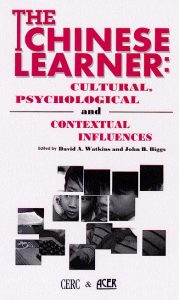 Edited by David A. Watkins & John B. Biggs
Edited by David A. Watkins & John B. Biggs
1996, reprinted 2005
ISBN 10: 0-86431-182-6
ISBN 13: 978-0-86431-182-5
HK$200 (local), US$32 (overseas)
Published by Comparative Education Research Centre (CERC) & Australian Council of Educational Research (ACER)
Order from CERC [out of stock] or online
Preview in Google Books
In August 1996 CERC’s first book, The Chinese Learner: Cultural , Psychological and Contextual Influences was in print. This is the first book to paint a clear, research based picture of how Chinese students and their teachers see the context and content of their learning both in Hong Kong and abroad. The focus of much of this research is the question ‘How can Chinese learners be so successful academically (often out-performing their Western peers) when their teaching and learning seems to be so oriented to rote memorization?’. It is concluded that at the heart of this paradox are cross-cultural differences in the very processes of teaching and learning , particularly concerning the relationship between memorizing and understanding and the nature of motivation. Widely held Western stereotypes and misconceptions of Chinese learners are shown to be largely without foundation.
Chapter Highlights:
1. Learning Theories and Approaches to Research: a Cross-cultural Perspective
Return to the CERC Studies in Comparative Education.
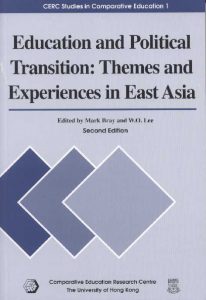 Edited by: Mark Bray & W.O. Lee
Edited by: Mark Bray & W.O. Lee
2001 2nd edition, 228pp
ISBN 10: 962-8093-84-3
ISBN 13: 978-962-8093-84-7
HK$200 (local), US$32 (overseas)
Published by the Comparative Education Research Centre (CERC)
Buy online
Preview on Google Books.
This book is the second edition of a volume published in 1997. Substantially revised and expanded, it throws new light on the links between education and political transition in a dynamic part of the world. Themes addressed by the book include globalisation, internationalisation and localisation; democratisation and nationalisation; colonial and postcolonial transitions; and liberal versus democratic approaches. Individual chapters focus on mainland China, Hong Kong, Korea, Macau, Mongolia, Singapore and Taiwan.
Reviewing the first edition, Philip Altbach commented in the Asia Pacific Journal of Education (Vol.18, No.2) that “these are very worthwhile essays that add significantly to our knowledge of … the region”. Readers will find the second edition an even stronger contribution to the field.
Mark Bray is Director of the Comparative Education Research Centre at the University of Hong Kong. He is also Secretary General of the World Council of Comparative Education Societies. W.O. Lee is Dean of the School of Foundations in Education at the Hong Kong Institute of Education. Prior to taking this position, he was Director of the Comparative Education Research Centre at the University of Hong Kong. Both editors are past Presidents of the Comparative Education Society of Hong Kong; and both have published extensively in the field of comparative education.
Contents
Introduction
Globalisation, Internationalisation and Localisation
Democratisation and Nationalisation
Colonial and Postcolonial Transitions
Liberal versus Traditional Approaches
Return to the CERC Studies in Comparative Education.
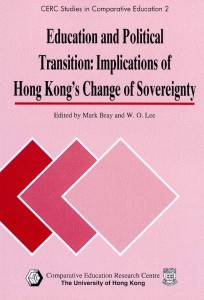 Mark Bray & W.O. Lee
Mark Bray & W.O. Lee
1997, 169pp
ISBN 10: 962-8093-90-8
ISBN 13: 978-962-8093-90-8
HK$100 (local), US$20 (overseas)
Published by Comparative Education Research Centre (CERC)
Preview on Google Books
Buy online
Mark Bray and W.O. Lee have co-edited a special number of the journal Comparative Education (Vol.33, No.2, 1997) on the implications for education of Hong Kong’s political transition. The special number will be published in June 1997, i.e. almost exactly at the time of the change of sovereignty. Subsequently it will be re-published in book form in the series ‘CERC Studies in Comparative Education’, thereby making it readily available to individuals and institutions which do not subscribe to the journal.
Abstracts of the contributions to the Special Number are as follows:
Editorial Introduction (Mark Bray & W.O. Lee)
The Editorial Introduction places the special number in the context of broader literatures on (a) education and political transition worldwide, and (b) political transition and social change in Hong Kong. It also highlights the conceptual contributions of the papers that follow, and shows how they can be linked to each other.
Education and Colonial Transition: The Hong Kong Experience in Comparative Perspective (Mark Bray)
While in some respects the nature of Hong Kong’s colonial transition seems unique, several parallels exist with transitions elsewhere. This paper begins by identifying major differences and similarities in the macro-framework. It then turns specifically to the education sector, noting that the parallel operation of multiple education systems within the boundaries of a single country is quite common, and therefore that models already exist for continued plurality of the type that might be envisaged for Hong Kong and the rest of China. Examining changes at various points in time, the paper observes that some reforms were made in Hong Kong’s educational provision well ahead of the commencement of colonial transition, and far in advance of parallel points in the history in other colonies. The paper then turns to specific changes which occurred during the period 1984-97, and to commentary on the further changes that may be expected in the continuing period of transition that commenced in 1997. Analysis of the currents and countercurrents makes Hong Kong an important case to study, both in its own right and as a case to compare and contrast with patterns elsewhere.
Education Policy and the 1997 Factor: The Art of the Possible Interacting with the Dismal Science (Anthony Sweeting)
“The 1997 Factor” has broad and narrow connotations. Its broader sense equates it with concern about Hong Kong’s future. Its narrow sense focuses on attitudes and actions affected by the change of sovereignty over Hong Kong at midnight on 30th June, this year. The present article investigates how both senses have influenced education policy in Hong Kong and, in particular, how resulting policy developments have reflected considerations of politics (the art of the possible) and economics (the dismal science). The article is divided into two main parts. The first, larger section offers a broad historical perspective, demonstrating that concerns about the future of the colony of Hong Kong are recurrent and almost exactly as old as the colony itself. The second section focuses briefly on three case studies of educational issues that have arisen recently from ideas related to the resumption of Chinese sovereignty over Hong Kong.
The Accommodation and Resistance to the Decolonisation, Neocolonisation and
Recolonisation of Higher Education in Hong Kong (Law Wing Wah)
This article identifies the impact of the political transition on the Hong Kong higher education system during the transitional period between 1982 and 1997. The struggles among the departing and incoming sovereign powers and local groups are also examined. The article argues that, during this period, three related colonial transition processes — decolonization, neo-colonization and recolonization — coexisted in Hong Kong higher education within the framework of one country and two systems. These processes further initiated spectra of their acceptance and resistance by the three major actors. On different occasions, the local government and groups played different, or even contradictory, roles: decolonising, neo-colonising or recolonising agents. They selectively participated in the three processes so as to create facilitating conditions for and obstacles to the control of higher education by the incoming ruling power in the post-1997 era.
Church, State and Education: Catholic Education in Hong Kong during the Political Transition (John Kang Tan)
Roman Catholic schools represent an important sector in Hong Kong’s education system, in both number and historical significance. As in many colonies in other periods of history, the Roman Catholic Church, in addition to other Christian churches, had a partnership relationship with the colonial government in the provision of education in Hong Kong. Was there any change in this relationship during the political transition to 1997? Has the prospective return of Hong Kong to the People’s Republic of China affected Catholic educational policies? This article examines these two questions in relation to the experience of other places in the world, and in relation to the special nature of the Catholic Church in Hong Kong, namely its link with the Vatican and its relations with China where church schools no longer exist.
Language and the Curriculum in Hong Kong: Dilemmas of Triglossia (Bob Adamson & Winnie Auyeung Lai)
As with colonial transitions elsewhere, language patterns in Hong Kong have changed with the return of sovereignty to China. Diglossia (whereby Hong Kong Cantonese and English predominate) is shifting to triglossia, as Putonghua, the official language of the People’s Republic of China, has become increasingly important. This paper focuses on the impact of colonial transition, and particularly the emergence of Putonghua, on the language subjects in the primary and secondary school curricula in Hong Kong. It argues that whilst the rationale for promoting Putonghua is logical, tensions are evident in the school curricula, most notably in two areas. Firstly, the curricula were already heavily biased in favour of language subjects, and secondly, the necessary teaching expertise for Putonghua is not readily available.
The Hong Kong School Curriculum and the Political Transition: Politicisation, Contextualisation and Symbolic Action (Paul Morris & K.K. Chan)
This paper uses a historical perspective to analyse the impact on the school curriculum of the return of Hong Kong to Chinese sovereignty. Whilst the transition has relaxed the criteria used by the state to select school knowledge, it has occurred at a time when the selective and allocative role of schooling has become paramount. Consequently, the transition has had a significant impact on the intended curriculum as a result of attempts by the departing colonial government to reform the curriculum. However, these reforms have had a limited impact on the implemented curriculum, which has been more strongly influenced by the emergence of a market in which schools compete for academically more able pupils.
Futuristic Metropolis or Second-Rate Port? Adult Education in Hong Kong before and after 1997 (Roger Boshier)
Despite China’s assurances about ‘one country, two systems’, adult education in Hong Kong is in for some big changes. The author maps the present adult education landscape, reviews research, posits four scenarios concerning the future, and identifies challenges to be faced by adult educators in Hong Kong after 1997. Returning Hong Kong to the bosom of a maoist, marxist-leninist state is not necessarily good news for marxist adult educators. Functionalist orthodoxy will be permitted, but those committed to marxist (critical, emancipatory) approaches to adult education will be in jeopardy because of laws about subversion. Adult education is shaped by the context in which it occurs, and what happens to critical adult educators in Hong Kong after 1997 will signal the extent to which ‘one country, two systems’ is reality or illusion.
Hong Kong’s Change of Sovereignty: School Leader Perceptions of Educational Policy and
School Administration (Clive Dimmock & Allan Walker)
This study captures the thoughts and perceptions of a group of Hong Kong principals on the transfer of sovereignty and its effects on education. The investigation addressed the following guiding research question: What, according to their perceptions, have been, and will be, the effects on education policy and on school-level management and curriculum, of the transfer of sovereignty? A qualitative approach was adopted, using naturalistic methods of inquiry. Nine principals of aided secondary schools were selected for interview according to procedures of purposive sampling. Findings indicate that, faced with uncertainty arising from the change of sovereignty, principals feel confident of managing and coping with situations at the school level in connection with curriculum and management. However, they express concern and greater uncertainty about their ability to manage changes emanating in the broader socio-political educational environment, especially in regard to values and norms and access and opportunity, all of which are likely to impact on their schools.
Education and Colonial Transition in Singapore and Hong Kong: Comparisons and Contrasts (Jason Tan)
As Hong Kong approaches its handover to Chinese sovereignty, it is instructive to compare its experience with that in other former British colonies. This article focuses on how education policies in areas such as medium of instruction and curriculum changed as Singapore moved towards self-government and independence in the 1950s and 1960s. It also compares the changes that took place in Singapore with those currently occurring in Hong Kong. Observations are made about the likelihood of the ‘one country, two systems’ concept working in Hong Kong after 1997.